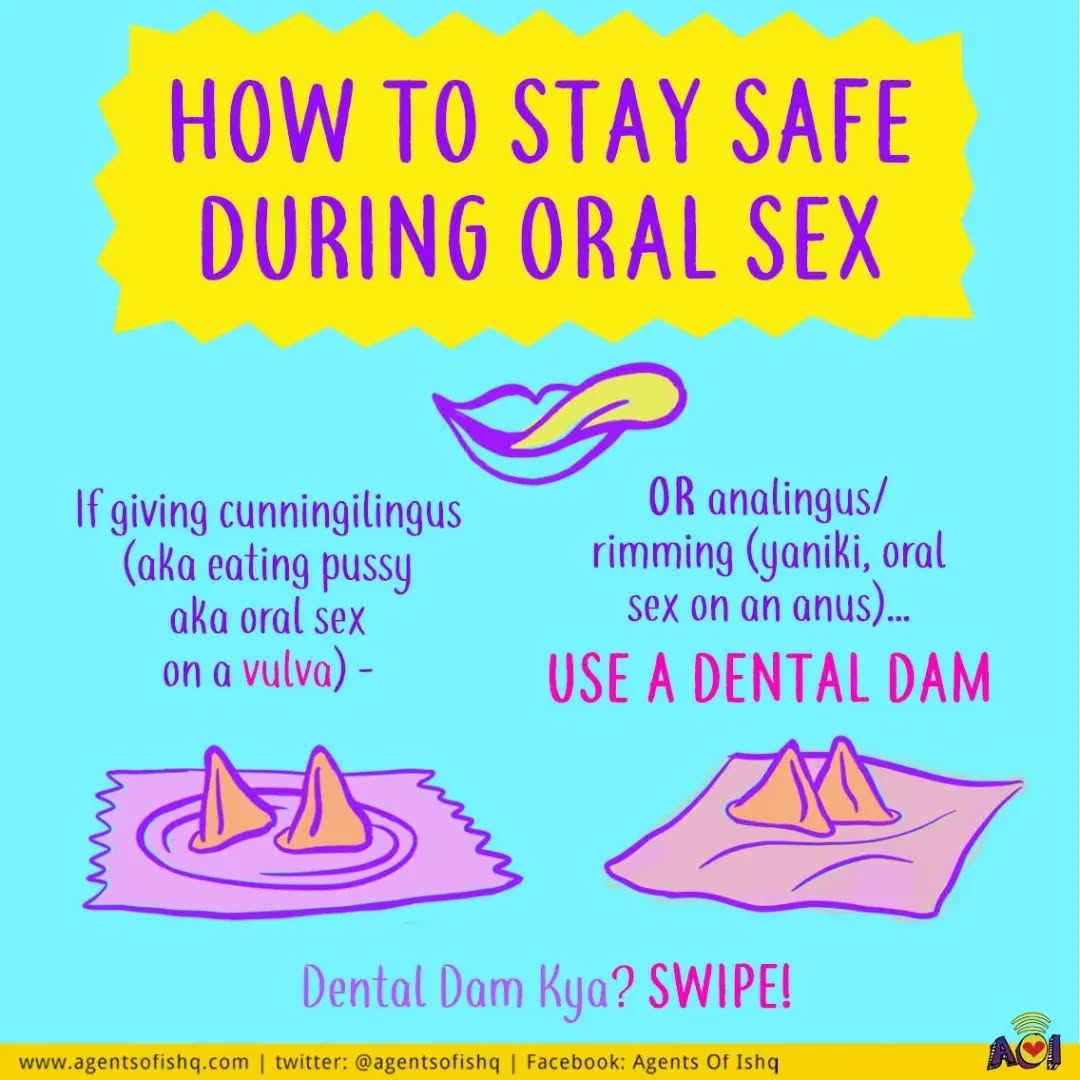You must have heard people saying that someone has so much sex drive compared to someone else. Or that when people are young and unmarried that they have more sex drive, or that men naturally have more sex drive than women.Are all the things that we hear about sex drive true? Is the sex drive a fixed thing like a hard drive? Let’s find out.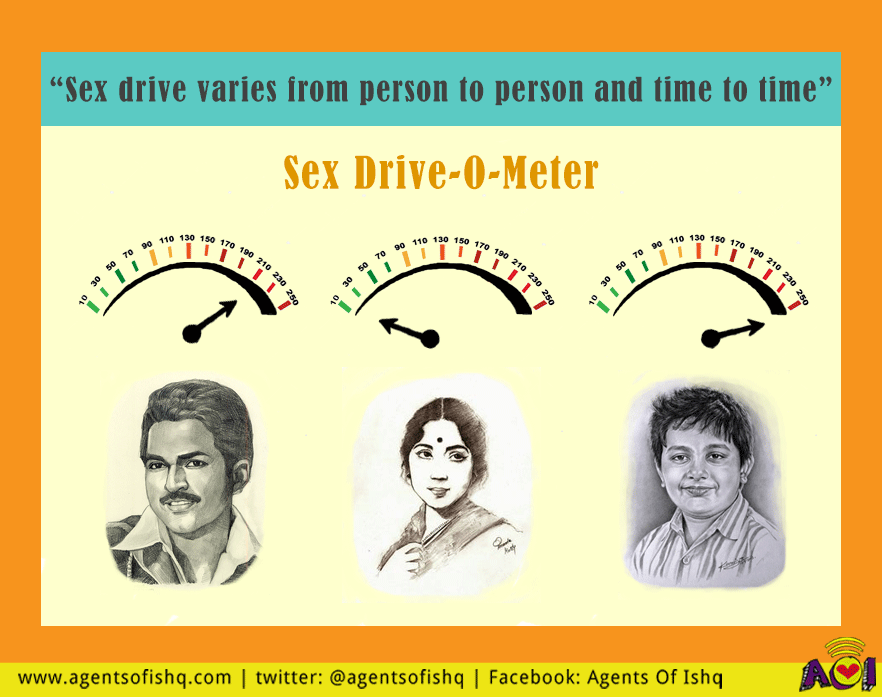 Sex drive, also known as the libido (from the Latin word for lust), indicates a person’s appetite and desire for sexual activities (how much, how often), and these fluctuate from person to person. Men and women, have different sex drives too—and historically, both stereotypes and scientific studies concluded frequently that men think about sex more than women.Is there such a thing as a ‘normal’ sex drive though?What Does Science Say?You may have heard that old myth that men think about sex every seven seconds but that may be just an extra-energetic myth. Remember all this is self-reported, so people may be adding or reducing masala.The average man apparently thinks about sex at least once a day, and any number of times up to 34 is considered ‘normal’.According to older studies women say that they think about sex a little over 18 times a day. New evidence from sex experts proves that women also think about sex very regularly, and societal taboos may have skewed how women responded in studies. An international survey conducted three years ago revealed that, in fact, women think about and want sex as much as or more than men.What does this uncertainty mean? There is no ISI mark to tell you the current quantity of sex to want.Still, people do worry if their libido is too low or too high. Here are some descriptions of libido levels.HypersexualityCompulsively thinking about sex can become a hugely distracting and irritating thing for some people. Extreme versions of this—where you think about sex so much that you indulge in behaviour like watching pornography frequently at work, for example. Here the problem is that your desire is getting past your good sense about where and when to get happy. Now this could be a symptom of a sex addiction, or hypersexuality. Or not.Jay, a 63-year-old, decided on his own that he had a sex addiction. One fine day, 22 years ago, he couldn’t be bothered anymore with chasing sex over activities like meeting friends, or hobbies. “I just decided I don’t want sex on my mind so much of the time. I wanted to do other things. So I decided, that’s it. Whenever I feel the urge, I will masturbate, but that gradually faded as well. I’m still a celibate. I just don’t need it, I think.”Here is our suggestion: DON’T try to diagnose yourself with Google. Talk to a trained therapist to understand whether you really have a problem.
Sex drive, also known as the libido (from the Latin word for lust), indicates a person’s appetite and desire for sexual activities (how much, how often), and these fluctuate from person to person. Men and women, have different sex drives too—and historically, both stereotypes and scientific studies concluded frequently that men think about sex more than women.Is there such a thing as a ‘normal’ sex drive though?What Does Science Say?You may have heard that old myth that men think about sex every seven seconds but that may be just an extra-energetic myth. Remember all this is self-reported, so people may be adding or reducing masala.The average man apparently thinks about sex at least once a day, and any number of times up to 34 is considered ‘normal’.According to older studies women say that they think about sex a little over 18 times a day. New evidence from sex experts proves that women also think about sex very regularly, and societal taboos may have skewed how women responded in studies. An international survey conducted three years ago revealed that, in fact, women think about and want sex as much as or more than men.What does this uncertainty mean? There is no ISI mark to tell you the current quantity of sex to want.Still, people do worry if their libido is too low or too high. Here are some descriptions of libido levels.HypersexualityCompulsively thinking about sex can become a hugely distracting and irritating thing for some people. Extreme versions of this—where you think about sex so much that you indulge in behaviour like watching pornography frequently at work, for example. Here the problem is that your desire is getting past your good sense about where and when to get happy. Now this could be a symptom of a sex addiction, or hypersexuality. Or not.Jay, a 63-year-old, decided on his own that he had a sex addiction. One fine day, 22 years ago, he couldn’t be bothered anymore with chasing sex over activities like meeting friends, or hobbies. “I just decided I don’t want sex on my mind so much of the time. I wanted to do other things. So I decided, that’s it. Whenever I feel the urge, I will masturbate, but that gradually faded as well. I’m still a celibate. I just don’t need it, I think.”Here is our suggestion: DON’T try to diagnose yourself with Google. Talk to a trained therapist to understand whether you really have a problem.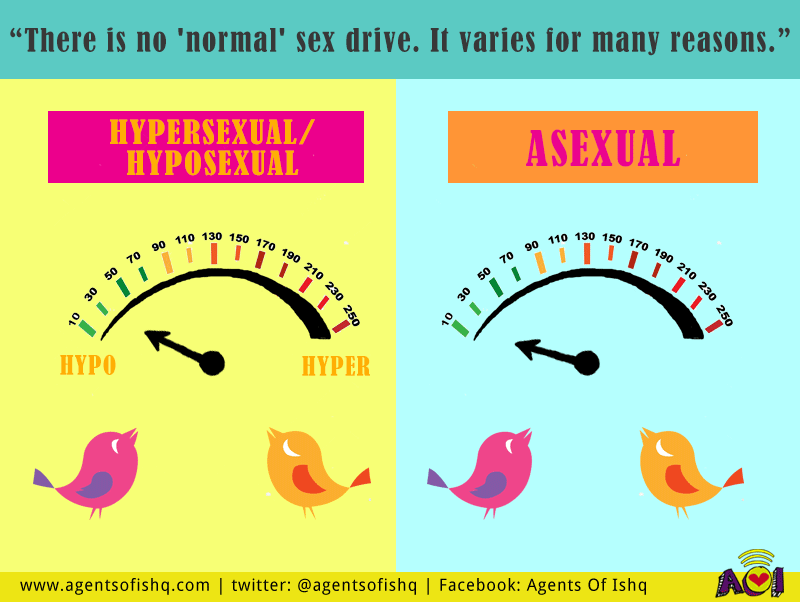
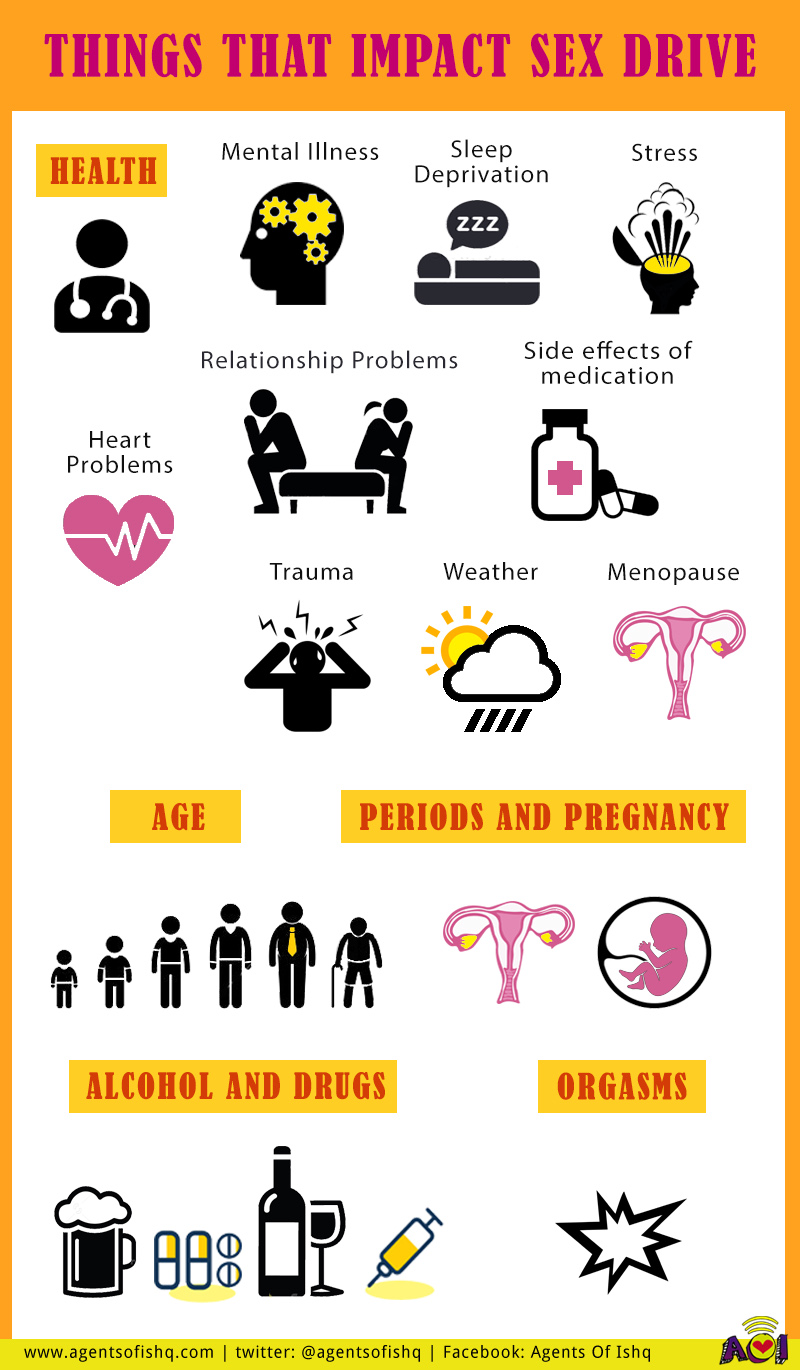
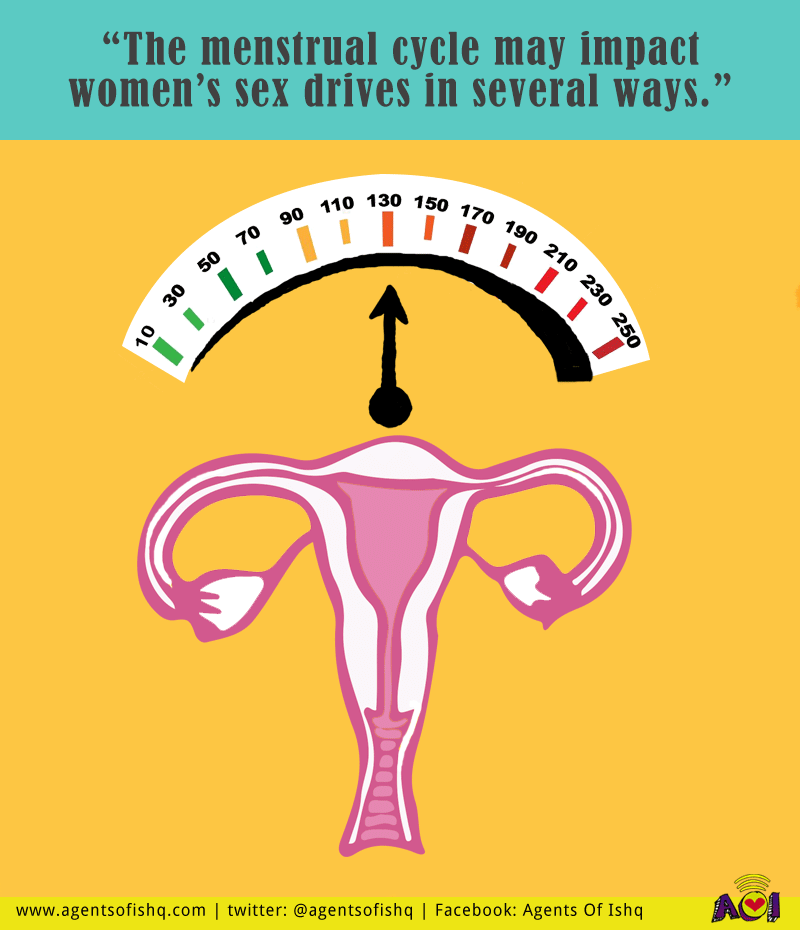 Twenty eight year old musician, Sumuthi P, realised long ago that she wasn’t alone in experiencing extreme fluctuations in her sex drive because of her menstrual cycle. She downloaded an app known as a period tracker, which reminds you when you are ovulating, and said it helped her understand why her body demanded sex more at certain times. She even convinced her partner to keep track of her period cycle, which made managing her sudden surge in sex drive during ovulation a lot easier.There are several factors that could explain why some women want sex during their period.For instance, vaginal discharge usually increases before the period, and increased wetness could make women feel more aroused. Women have increased levels of a hormone called progesterone (also released during pregnancy) in the run-up to the period, and this can decrease libido, but once the progesterone levels increase after the first day of menstruation, it could mean women feel more inclined towards sex.During pregnancy, many women say they experience a significant increase in libido in the first two trimesters, but by the third trimester, other bodily changes like weight gain, morning sickness, or physical discomfort may reduce the sex drive for some women.
Twenty eight year old musician, Sumuthi P, realised long ago that she wasn’t alone in experiencing extreme fluctuations in her sex drive because of her menstrual cycle. She downloaded an app known as a period tracker, which reminds you when you are ovulating, and said it helped her understand why her body demanded sex more at certain times. She even convinced her partner to keep track of her period cycle, which made managing her sudden surge in sex drive during ovulation a lot easier.There are several factors that could explain why some women want sex during their period.For instance, vaginal discharge usually increases before the period, and increased wetness could make women feel more aroused. Women have increased levels of a hormone called progesterone (also released during pregnancy) in the run-up to the period, and this can decrease libido, but once the progesterone levels increase after the first day of menstruation, it could mean women feel more inclined towards sex.During pregnancy, many women say they experience a significant increase in libido in the first two trimesters, but by the third trimester, other bodily changes like weight gain, morning sickness, or physical discomfort may reduce the sex drive for some women. But enjoy the drive!
But enjoy the drive!
 Sex drive, also known as the libido (from the Latin word for lust), indicates a person’s appetite and desire for sexual activities (how much, how often), and these fluctuate from person to person. Men and women, have different sex drives too—and historically, both stereotypes and scientific studies concluded frequently that men think about sex more than women.Is there such a thing as a ‘normal’ sex drive though?What Does Science Say?You may have heard that old myth that men think about sex every seven seconds but that may be just an extra-energetic myth. Remember all this is self-reported, so people may be adding or reducing masala.The average man apparently thinks about sex at least once a day, and any number of times up to 34 is considered ‘normal’.According to older studies women say that they think about sex a little over 18 times a day. New evidence from sex experts proves that women also think about sex very regularly, and societal taboos may have skewed how women responded in studies. An international survey conducted three years ago revealed that, in fact, women think about and want sex as much as or more than men.What does this uncertainty mean? There is no ISI mark to tell you the current quantity of sex to want.Still, people do worry if their libido is too low or too high. Here are some descriptions of libido levels.HypersexualityCompulsively thinking about sex can become a hugely distracting and irritating thing for some people. Extreme versions of this—where you think about sex so much that you indulge in behaviour like watching pornography frequently at work, for example. Here the problem is that your desire is getting past your good sense about where and when to get happy. Now this could be a symptom of a sex addiction, or hypersexuality. Or not.Jay, a 63-year-old, decided on his own that he had a sex addiction. One fine day, 22 years ago, he couldn’t be bothered anymore with chasing sex over activities like meeting friends, or hobbies. “I just decided I don’t want sex on my mind so much of the time. I wanted to do other things. So I decided, that’s it. Whenever I feel the urge, I will masturbate, but that gradually faded as well. I’m still a celibate. I just don’t need it, I think.”Here is our suggestion: DON’T try to diagnose yourself with Google. Talk to a trained therapist to understand whether you really have a problem.
Sex drive, also known as the libido (from the Latin word for lust), indicates a person’s appetite and desire for sexual activities (how much, how often), and these fluctuate from person to person. Men and women, have different sex drives too—and historically, both stereotypes and scientific studies concluded frequently that men think about sex more than women.Is there such a thing as a ‘normal’ sex drive though?What Does Science Say?You may have heard that old myth that men think about sex every seven seconds but that may be just an extra-energetic myth. Remember all this is self-reported, so people may be adding or reducing masala.The average man apparently thinks about sex at least once a day, and any number of times up to 34 is considered ‘normal’.According to older studies women say that they think about sex a little over 18 times a day. New evidence from sex experts proves that women also think about sex very regularly, and societal taboos may have skewed how women responded in studies. An international survey conducted three years ago revealed that, in fact, women think about and want sex as much as or more than men.What does this uncertainty mean? There is no ISI mark to tell you the current quantity of sex to want.Still, people do worry if their libido is too low or too high. Here are some descriptions of libido levels.HypersexualityCompulsively thinking about sex can become a hugely distracting and irritating thing for some people. Extreme versions of this—where you think about sex so much that you indulge in behaviour like watching pornography frequently at work, for example. Here the problem is that your desire is getting past your good sense about where and when to get happy. Now this could be a symptom of a sex addiction, or hypersexuality. Or not.Jay, a 63-year-old, decided on his own that he had a sex addiction. One fine day, 22 years ago, he couldn’t be bothered anymore with chasing sex over activities like meeting friends, or hobbies. “I just decided I don’t want sex on my mind so much of the time. I wanted to do other things. So I decided, that’s it. Whenever I feel the urge, I will masturbate, but that gradually faded as well. I’m still a celibate. I just don’t need it, I think.”Here is our suggestion: DON’T try to diagnose yourself with Google. Talk to a trained therapist to understand whether you really have a problem.
Asexuality
Some time ago, Mohona, a 21-year-old woman, announced that she was asexual. Does that mean not having sex? No actually, asexuality is a marked lack of appetite for sex. Contrary to what many people assume, it is not a medical condition or necessarily a psychological shortcoming. Asexual people may feel romantic love, deep attraction, and passion for other people, even have life partners and healthy relationships, without feeling any desire to consummate their relationships with sex.“After I started talking about it, people either laughed at me, advised me to seek medical and psychological help, or insisted that what I had was completely unnatural and impossible,” Mohana explained. “But there are online forums that helped me figure out that although I’m part of a rare section of society. There are others like me—who just don’t feel a need for any kind of sexual activity.”While hypersexuality and asexuality lie at two opposite ends of the spectrum, any number of things can affect a person’s sex drive as well.If you compare it to another appetite, say eating, then it becomes clear, doesn’t it? Think of all the different reasons that affects the frequency or the quantity you eat.In other words, there are large variations in people’s sex drives.Things that impact sex drive
Health
Mental illness and chronic depression can mean a dampened libido. (Though a high sex drive can also occasionally accompany undiagnosed mental illness.)Sleep deprivation, stress, menopause, problems with your heart thyroid and side effects of certain medications can reduce libido.Relationship problems, or personal issues like psychological trauma attached to sex, can lead to difficulties with libido.Weather can play a role. Some people feel miserable or get seasonal depression because of the lack of daylight during extreme winter, which means reduced serotonin (a hormone that improves mood) and sometimes a lower libido. Exercise, can help towards a healthy sex drive, as it boosts blood flow and also releases stress-reducing mood improving hormones called endorphins.
Age
Fifteen-year-old Arjun says that he used to worry about how much sex was on his mind. “During puberty I think I probably thought about sex every few minutes. When I was 11, suddenly things changed and even looking at a woman would make me get an erection—they’re painful and so embarrassing,” he says, cringing visibly. “Now it’s different. I’m much calmer, and the fact that I’m not that eager to have sex definitely makes me smoother,” Arjun added. The hormone responsible for the male sex drive, testosterone, is highest in adolescent males, usually in their late teens, but it looks like Arjun had this phase earlier.For women, though, sex drive can vary unpredictably with age. Even if the idea that women reach their sexual ‘peak’ (the time when they have the highest sex drives and levels of oestrogen, and supposedly reach sexual ‘maturity’ and acquire increased confidence) in their 30s is outdated—there is a notion that women have stronger sex drives in their 30s and early 40s. Kiran, a 37-year-old woman, disagrees. She hasn’t had sex in a long time, and is especially annoyed because people told her that she would be the greatest sex in her 30s, and that as a lesbian, she would get it even easier. “I’m in the middle of dry spell that’s lasted two years now. I feel aroused once in a while but I think about sex very rarely—maybe a couple of times a month,” she said.Periods and pregnancy
The menstrual cycle appears to impact women’s sex drives in several ways. Women are supposed to feel the libido strongest during ovulation (which occurs typically two weeks prior to getting the period), as the body gets ready for conception every month. Twenty eight year old musician, Sumuthi P, realised long ago that she wasn’t alone in experiencing extreme fluctuations in her sex drive because of her menstrual cycle. She downloaded an app known as a period tracker, which reminds you when you are ovulating, and said it helped her understand why her body demanded sex more at certain times. She even convinced her partner to keep track of her period cycle, which made managing her sudden surge in sex drive during ovulation a lot easier.There are several factors that could explain why some women want sex during their period.For instance, vaginal discharge usually increases before the period, and increased wetness could make women feel more aroused. Women have increased levels of a hormone called progesterone (also released during pregnancy) in the run-up to the period, and this can decrease libido, but once the progesterone levels increase after the first day of menstruation, it could mean women feel more inclined towards sex.During pregnancy, many women say they experience a significant increase in libido in the first two trimesters, but by the third trimester, other bodily changes like weight gain, morning sickness, or physical discomfort may reduce the sex drive for some women.
Twenty eight year old musician, Sumuthi P, realised long ago that she wasn’t alone in experiencing extreme fluctuations in her sex drive because of her menstrual cycle. She downloaded an app known as a period tracker, which reminds you when you are ovulating, and said it helped her understand why her body demanded sex more at certain times. She even convinced her partner to keep track of her period cycle, which made managing her sudden surge in sex drive during ovulation a lot easier.There are several factors that could explain why some women want sex during their period.For instance, vaginal discharge usually increases before the period, and increased wetness could make women feel more aroused. Women have increased levels of a hormone called progesterone (also released during pregnancy) in the run-up to the period, and this can decrease libido, but once the progesterone levels increase after the first day of menstruation, it could mean women feel more inclined towards sex.During pregnancy, many women say they experience a significant increase in libido in the first two trimesters, but by the third trimester, other bodily changes like weight gain, morning sickness, or physical discomfort may reduce the sex drive for some women.Alcohol and drugs
Drug abuse, particularly of hard drugs like heroin, can increase fatigue, while also reducing the production of hormones like oestrogen and testosterone, and therefore messing up people’s sex drives. Chronic alcoholism or binge drinking can also reduce libido, in some cases leading to reduced or a complete lack of interest in sex.Orgasms and sex drive
Does your libido decrease if you have an orgasm? Not necessarily, especially as women have the capacity for having multiple orgasms. But learning how to give yourself orgasms can make you feel fulfilled and desire sex less frequently.Sahana, ‘resigned’ herself to masturbation at the grand old age of 21, and she says it has led to a much healthier sex drive for her. “When I was around 17, I used to have sex with my boyfriend at the time, but I wasn’t getting the fulfilment I needed; it would all end too quickly. I would stay frustrated and think about sex every day, and this worried me—did I have a sex addiction?” She says her “orgasm situation” was dire. “But when I figured out how to masturbate at 21, everything changed. Now I’m not constantly frustrated because I can satisfy myself when I want, every couple of days.”FINALLY…
What we’ve noticed is that although people worry about their libido, and whether they are thinking about sex too often or too sparingly, there is a tendency to resolve it on your own, through eating, seeking counselling, masturbation, pursuing other hobbies, or complete abstinence.To tweak Dharmendra in Johnny Gaddar: it’s not about the gender or age; it’s about the mileage. Okay, note to self: must never try to tweak Dharmendra. But enjoy the drive!
But enjoy the drive!



